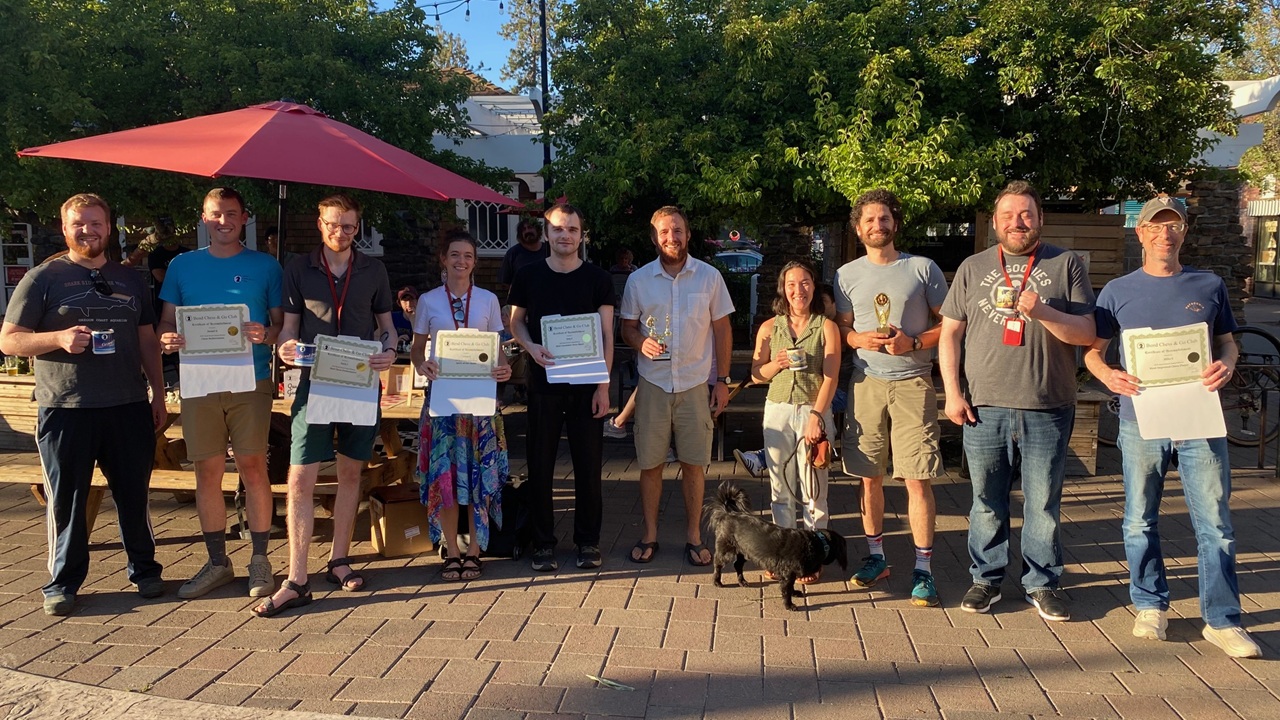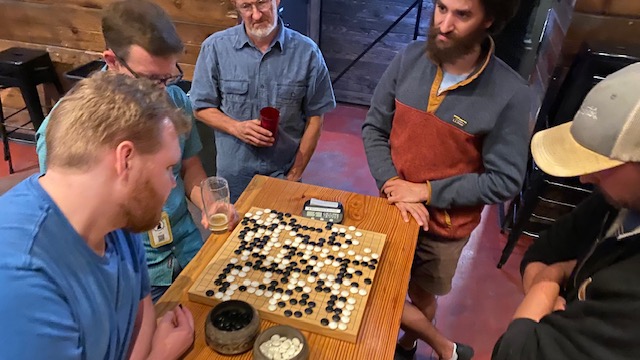FAQ
We meet weekly at Crux Fermentation Project, Thursdays from 6pm-9pm

Beginners & Champions stand side-by-side with their Quad-Season 2025 Awards
- My child is interested in Chess/Go. Are there youth-programs or tutoring available?
- Parents should consult the North-West Chess/Scholastic page for local youth-programs or resources. Bend Chess & Go Club does not offer any such programs.
- Are children welcome?
- While the club is primarily aimed at adults, juniors are always welcome! Parents should be aware that the average age at the club is probably around 30, and that on most (but not all) nights their child may be the youngest player. In practice, young people do really well here when they are undaunted by adults. Everyone just wants to play, and its always a joy to see young people exploring the game. Young people can and have thrived here - its a wholesome and fun atmosphere. But this is a competitive club, and competition is fierce! Do you want to start a Child-friendly Club? Get in touch and we will try to help: bendchess@gmail.com
- Do you do Chess Coaching?
- No, Bend Chess & Go Club meets weekly to play and to compete. We do not offer coaching or tutoring.
- I'm a beginner, are there other players at my skill-level?
- Most likely, yes. But understand that with Club-level play beginners become stronger players so the current-pool of beginners is always changing. Each new-member got themselves to a certain point with the game before deciding to attend a club and if you are concerned with your level, welcome to the Club! Don't stay away! Come and play!
- Do I need to know how to play Chess or Go already before attending?
- Access to Chess & Go resources are widely available these days. Taking a little bit of time in advance to learn Chess or Go will reward you with some independence when you visit and you should examine the next questions!
- What is Go?
- Go is an ancient board game from East Asia. It is played by placing Black & White stones on a grid. Each player jostles for control of the board using their stones to surround territory, all while trying to prevent those stones getting surrounded (and therefore captured.) Anyone unfamiliar with the game might enjoy Google DeepMind's AlphaGo documentary which offers a cinematic introduction to the game.
- How can I learn Go?
- For a practical start towards learning the rules, we recommend the Interactive Way to Go. Looking further, players are encouraged to the Online Go Server's Learning Pathway.
- How can I learn Chess?
- Robert Ramirez's Chess Course is an excellent free-resource for anyone prefering video. Anyone looking for a more interactive guide should start with lichess.org/learn pages - you can also play real opponents on that site and guage your level.
- Do I need to bring anything?
- The club provides boards & clocks. For Chess, we usually have plenty of equipment (but bring you're own if you have a strong preference.) Go equipment is more sparse and we can run out of Go boards on busy nights.
- I’ve never played with a clock before, is that required?
- Clocks are a normal part of club-level play but don't be deterred! It's important to limit the duration of games when our time at the club is limited and you will quickly become comfortable with the clock. When playing with a clock each player has a pool of time that gradually ticks-down whenever it is their turn. Time may be added at the end of each move (called a time "increment") or in the case of Go games, time is often restored at the end of each turn (called a time "period") and so the clock serves as a pace-setter rather than a punicious addition. Pressure is added, of course, and complete-beginners often play without clocks until they develop the board-vision to play under such conditions. We all understand this and so most members will gladly play without a clock if you'd prefer a more relaxed game.
- What time-control is played at the club?
- Chess games are usually 10+5 (10 minutes with a 5-second increment) and Go games are usually 5m+30sx5 (5 minutes with 5x 30-second periods.) In practice, each Chess game lasts ~25 minutes and each Go game lasts ~30 minutes. Note: any game played outside of competition can be played with any time-control and members often experiment with faster games. Slower games are much rarer unless playing some sort of teaching game.
- Is it okay to eat or drink while playing?
- Certainly, we rely on our hosts to allow the club to run, and buying a drink or some food is a great way to thank them and help support the club's future.
- How do I find someone to play?
- You are welcome to challenge anyone who isn’t currently playing a game. The more people you challenge, the better time you will have! If you’re unsure about who to ask, please reach out to a club member wearing a lanyard, who should be able to help assess your skills and pair you with someone close to your skill level.
- What do I do after I finish a game?
- You are welcome and encouraged to do some analysis of the game with your opponent. Rematches usually switch colors for chess, or you can find another opponent. The more people you challenge, the better time you will have!
- What are Quads?
- We host a monthly competition that regular members participate in throughout the month. Most games played at the club are casual, but often you will see a *Quad Game* sign next to a board - that game is part of the competition, so we try not to disturb them. If you'd like to learn more, check out the Quads page or ask when you visit the club!
- Do you change venues?
- Yes, our winter venue, Crux, hosts us for most of the year. Our summer venue, The Commons, hosts us for casual play from July-September.
- My Question isn't answered here!
- Try our About page, enquire at bendchess@gmail.com or visit us one club-night and ask in-person!

Go-Players enjoying a game of Rengo (four-player Go) at our Winter venue, Crux